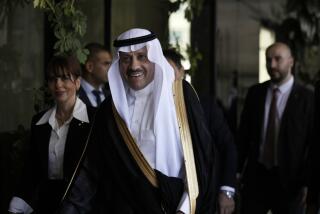Soviet Troops Would Be Welcome, Saudis Say : Mideast: Riyadh previously regarded the Kremlin as a fomenter of revolution. The shift reflects major political changes in the region as a result of the gulf crisis.
- Share via
MOSCOW — Saudi Arabia, long opposed to the Soviet Union’s presence in the Middle East, now would welcome units of the Red Army if Moscow decides to join the multinational force confronting Iraq, the Saudi foreign minister said here Tuesday.
The minister, Prince Saud al Faisal, said Soviet troops would be as welcome as Arab, American, West European and others have been in forging an international alliance to defend his country and to force Iraq to withdraw from Kuwait.
He praised as “positive and beneficial” the current Soviet role in the Middle East--notably Moscow’s strong opposition to the Iraqi seizure of Kuwait--and he appeared to have encouraged the Kremlin during his three days of talks in Moscow to become even more active.
“We have, from the beginning, welcomed Arab troops, Muslim troops and friendly troops from everywhere,” the prince told a news conference, “and we certainly would welcome troops from the Soviet Union.”
He said Saudi Arabia would also appreciate greater Soviet participation in the naval blockade of Iraq. The three Soviet warships in the Persian Gulf have helped spot possible blockade runners but have not joined Western navies in stopping and boarding vessels.
President Mikhail S. Gorbachev virtually ruled out sending Soviet troops to Saudi Arabia or other countries on the Arabian Peninsula when he met with President Bush in Helsinki on Sept. 9. But what amounts to an invitation by Saudi Arabia could prove difficult to resist, symbolizing as it does full acceptance by the conservative Saudis of the Soviet Union’s legitimate role in the Middle East.
“The Soviet Union has always played a major role in the Middle East,” Prince Saud said. “We believe sincerely that they can and do now play a positive and beneficial role--a role that we welcome and encourage at the same time.”
He said that he had discussed new diplomatic initiatives, including one that Moscow and Riyadh might undertake jointly, to bring the gulf crisis to a peaceful resolution. But he added, “Neither of us have seen any signals that Iraq is willing to withdraw from Kuwait.”
Prince Saud’s comments, like the agreement Monday between Moscow and Riyadh to restore diplomatic relations after a 52-year suspension, reflected the major political shifts under way throughout the Middle East as a result of the crisis in the gulf region.
Since the late 1940s, when it effectively allied itself with the United States, Saudi Arabia had opposed Soviet intervention in the region, regarding the Kremlin as a fomenter of revolution and an enemy of Islam. The Saudis spent billions of dollars in financing conservative governments and political movements in their determination to curtail Soviet influence.
But the Iraqi seizure of Kuwait brought to a quick conclusion the steady improvement in Saudi-Soviet relations that had begun in 1989 with the withdrawal of Moscow’s forces from Afghanistan, where Saudi-supported Muslim rebels had battled the Soviet-backed Communist regime in Kabul.
“Our hope is that we started not just diplomatic relations but that we have opened the road to a more useful dialogue and the establishment of more solid relations at all levels,” Prince Saud said, quoting a message that King Fahd had sent to Gorbachev.
The prince said he hopes that the joint Saudi-Soviet condemnation of Iraq, which invaded, occupied and annexed Kuwait last month, will persuade Iraq to withdraw its troops from the oil-rich sheikdom and resolve its original grievances through mediation.
“The united stand that Saudi Arabia and the Soviet Union have toward this is a reflection of the united international position,” he said. “Saudi Arabia had stood with Iraq through many crises and stood with Iraq in every possible way. . . . The Soviet Union in the international community was the (non-Arab) country that had the most solid relations with Iraq.
“When these two countries stand together for the withdrawal of Iraq from Kuwait and for the restoration of Kuwait’s sovereignty and territorial integrity and identify their positions in a common way, it should give a message to Iraq that its position is untenable.”
Both countries have stressed that the crisis can be resolved only on the basis of the U.N. Security Council’s resolutions calling for Iraq’s complete withdrawal from Kuwait and the restoration of Kuwaiti independence, sovereignty and territorial integrity.
As the focus of the massive military buildup led by the United States in the wake of Iraq’s seizure of Kuwait on Aug. 2, Saudi Arabia continues to make clear that force is an option if Iraq refuses to withdraw.
“We hope that in themselves these (U.N. sanctions, including a trade embargo) would lead to a solution,” Prince Saud said. “We do not support the use of force in international disputes, but force has been used, and some way must be found to guarantee the independence and territorial integrity of Kuwait. It is Iraq that has waged war.”
More to Read
Sign up for Essential California
The most important California stories and recommendations in your inbox every morning.
You may occasionally receive promotional content from the Los Angeles Times.













